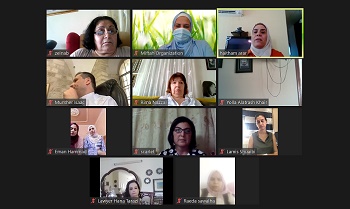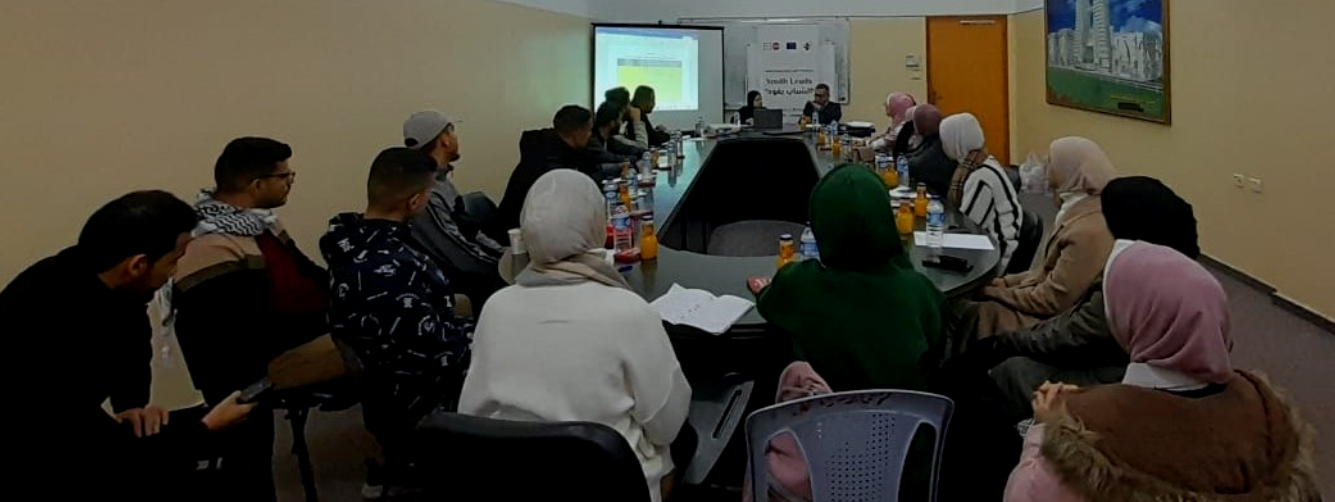
Ramallah -- 8/9/2020 MIFTAH recently held a zoom meeting in partnership with the NGO Civil Coalition for the Personal Status Law, which is headed by the General Union of Palestinian Women entitled “Proposed policies and procedures for developing ecclesiastic and sharia courts”. The meeting was held to present and discuss public policy papers on measures in these courts, which offered alternative measures and policies to them; the measures in effect are aimed at consolidating the hierarchal authority within the family, especially regarding issues of discord and conflict, alimony and inheritance under the pretext of maintaining family coherence. The public policy papers were prepared by MIFTAH and focus on the gender gaps in policies and procedures in ecclesiastic and sharia courts in Palestine.
The session began with presentations that corroborated the content of the policy paper, which was prepared by the Evangelical Lutheran Church Court of First Instance in Jordan and the holy lands, Scarlett Bishara, on the discriminatory provisions and measures in personal status laws adopted by Christian denominations. Her paper focused on marriage, alimony, guardianship and inheritance, also addressing the obstacles that prevent women from accessing justice, which include: costly litigation fees, lengthy litigation measures, the weak representation of women in the Ecclesiastic Court Council and lack of legal knowledge regarding personal status laws among women. The paper produced several recommendations and alternatives such as: the need to review personal status laws of Christian denominations to include the principles of rights-based justice and equality; to ratify a unified law for all denominations; encourage the appointment of women judges specialized in ecclesiastic courts; focus on the education and awareness of women on ecclesiastic laws and provide socio-legal services to women involved in court cases.
Meanwhile, the paper on conflict and discord prepared by Khadija Hussein also produced several recommendations, including the need to develop the current system of reform and domestic arbitration. This includes resolving domestic disputes via mediation and a program for family and social reform on condition of a guarantee of adherence to equality, justice and the protection of vulnerable sectors such as women. There is also the need to reconsider the policies for terminating a marriage, starting from the principle of equality regarding the right of both parties to terminate it; granting the party affected by the continuation of the marriage the means of resorting to separation lawsuit based on damages. Furthermore, accessing justice and ending gender-based violence within the family requires integration between the different components of the judicial system and means of legal redress; considering the issue of violence against women as an independent criminal act, which must to be referred to the relevant judicial parties for review; creating appropriate referral mechanisms to provide protection for battered women.
Meanwhile, Reverend Munther Ishaaq, pastor for the Bethlehem and Beit Jala Lutheran Churches and Dean of the Bible College said, “As Christian and Muslim scholars we strive to achieve justice and to prove that justice and equality are not counter to religions; that justice for women is not counter to religion but is at the core of it. The monotheistic religions all call for justice and equality, which would be reflected in the laws as well.” Ishaaq also maintained that changing personal status laws was not impossible, citing the experience of the Lutheran denomination as proof.
Regarding the policies and measures pertaining to sharia courts and arbitrators, the interventions stressed on the need for a mechanism for appointing arbitrators by the judge, the criteria for their appointment and the reasons for the stipulation that arbitrators must be male. This requires that from the start, arbitrators must have experience and knowledge of women’s rights in Palestinian law and international human rights criteria; they also pointed to the importance of reviewing the topic of fees and costs of arbitrators, which ranges between NIS500-700 for each arbitrator and the financial burden it imposes. It is necessary that the system of arbitration is developed and reformed and that women have easier access to justice, namely financial access, whereby financial burdens are not a hindrance to women benefiting from the justice system. This is in light of the regional and international approaches dealing with the concept of mediation in domestic disputes as an integrated system.
As for Judge Abdallah Harb, he called for equity between men and women. “The problem is with the cultural legacy and prevailing customs and traditions; it is not the responsibility of the clergy.” Harb added, “In the courts, we do not deal with the cases in front of us as clergy but as judges,” concluding that “arbitration needs discipline and commitment. I support amending some theological texts in favor of women and the family as a whole; any area that changes can be made, we can just go in and make them”.
On her part, coordinator for the Coalition Haitham Arar, said that the Palestinian Basic Law is a law that is made to govern the entire Palestinian people, pointing to certain loopholes in draft resolutions and circulars that are exploited by certain people. In this context, Arar confirmed on the importance of emphasizing the culture of amendments among everyone, especially judges, warning against factions that might take advantage of certain sharia judges. “We must start the conversation with our reality and Palestinian culture and emphasize that our society needs fair and practical solutions. There must be continuous discussions in order to reach a unified vision in this regard for all citizens.”
MIFTAH project manager, Najwa Sandouqa-Yaghi said the session was part of the interventions of its OXFAM-funded project “Conflict and Fragility” and is also a continuation of MIFTAH’s efforts, in coordination with the GUPW to make reforms and amendments to the current personal status laws and to policies and procedures, in parallel with the national efforts to develop a Palestinian law based on a women’s rights approach for personal status and domestic affairs.








